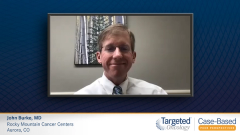
Novel Therapies for R/R DLBCL
John Burke, MD, reflects on current novel therapies used in the treatment of relapsed/refractory diffuse large B-cell lymphoma (R/R DLBCL).
John Burke, MD: There are a number of additional novel agents available now for patients with relapsed DLBCL [Diffuse large B-cell lymphoma]. Of course, there are three CAR [chimeric antigen receptor] T-cell products on the market. These include axi-cel [axicabtagene ciloleucel], tisagenlecleucel, and liso-cel [Lisocabtagene maraleucel] which was just recently approved. As a rule, these have a high level of activity with overall response rates ranging between 50% and 80%, and complete remission rates ranging in the ballpark of 30% to 60%. Most of the products would have a 50% rate and with durable CRs [complete responses] being between 30% and 50%. These are highly effective treatments. Of course, they require quite a bit of logistics. They require referral to centers capable of delivering these treatments.
Many centers will hospitalize patients for the treatment due to the potential toxicities. The toxicity profiles of CAR T-cell therapy include cytokine release syndrome and neurological events. Another important agent is polatuzumab vedotin, given in combination with bendamustine and rituximab [pola-BR]. This was approved based on a randomized phase 2 trial demonstrating significant improvement in response rate, and even overall survival in patients treated with pola-BR in comparison with BR [bendamustine and rituximab] alone. One of the potential toxicities of polatuzumab vedotin to keep in mind is neurological or peripheral neuropathy and cytopenias, but it is still a very important drug now in patients with relapsed large cell lymphoma.
Finally, we also saw another new approval for Selinexor. It was FDA approved early last year. This was based on a study called the SADAL study, which enrolled patients who had received between 2 and 5 prior lines of therapy. The dosing of Selinexor for patients with large cell lymphoma is different from myeloma; patients with with large cell lymphoma are given 60 mg instead of 80 mg on days 1 and 3 of each week. A number of patients did require dose reductions due to toxicities.
The efficacy of Selinexor as a single agent is demonstrated in the overall response rate of 28% and complete response rate of 12%. The median of progression-free survival duration was only 2.6 months, but there were some patients in the trial with very durable remissions. Toxicities of Selinexor include cytopenias, hyponatremia, and then GI [gastrointestinal] toxicities such as anorexia and nausea. Selinexor does require a fairly aggressive antiemetic therapy as prevention for drug-induced nausea and vomiting. Those are the primary new agents available in patients with relapsed DLBCL.
Transcript edited for clarity.
Case: A 76-Year-Old Man with R/R DLBCL
Initial presentation
- A 76-year-old man presented with fatigue, loss of appetite
- PMH: atrial fibrillation, hypertension, medically controlled
- PE: palpable 5 cm right inguinal mass; bilateral axillary lymphadenopathy; splenomegaly
- ECOG PS 2
Clinical Workup
- Labs: Hb 9.9 g/dL; all others WNL
- Hepatitis B, C and HIV negative
- Excisional biopsy of the lymph node confirmed DLBCL, GCB subtype
- IHC positive for CD20
- FISH panel: t(14;18) with a BCL2 rearrangement
- Flow cytometry: CD19-postitive
- Whole body PET/CT scan showed diffuse lymphadenopathy , splenomegaly
- Ann Arbor stage III DLBCL
- IPI score intermediate-risk
Treatment
- Treated with R-CHOP x 6 cycles
- First post-treatment PET/CT scan was unremarkable; CR
- 1 year later he presents with recurrent axillary lymphadenopathy
- Repeat biopsy confirms relapse of DLBCL, GCB subtype
- He was ineligible for high-dose chemotherapy and ASCT
- Initiated tafasitamab + lenalidomide

















